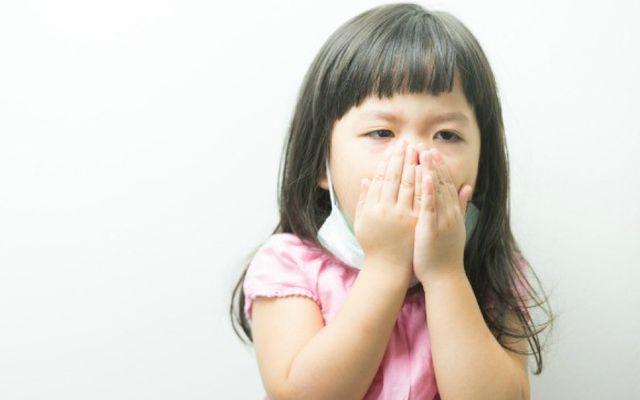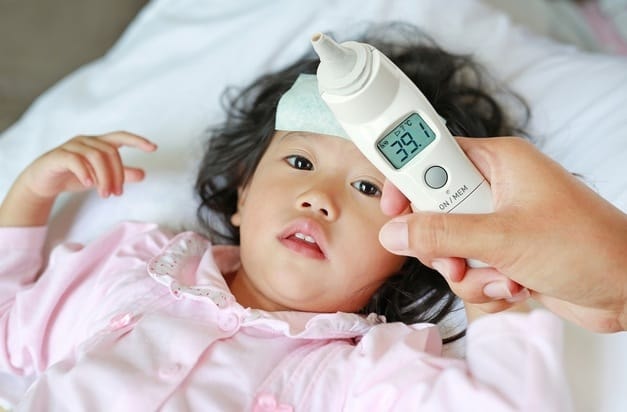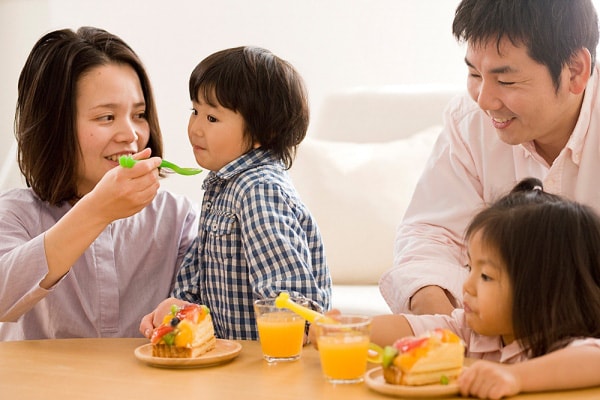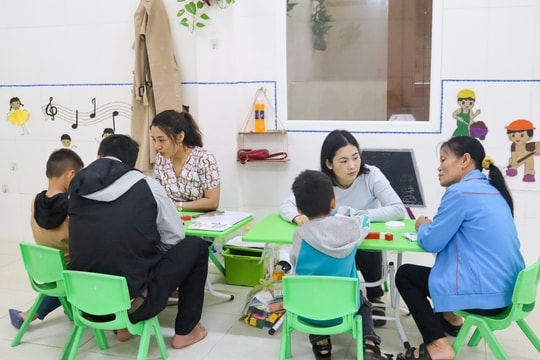Proper care to help children recover quickly from illness
Humid weather is a favorable condition for bacteria and viruses to invade and cause diseases in young children. The reason is that children have weak resistance, so they are susceptible to contagious diseases such as cough, fever, diarrhea, etc. Proper care to help children recover quickly is of great concern to many parents.
Care for children when they cough
The weather is changing from hot and humid to cold and rainy, so children are susceptible to coughs. Coughing can be a sign of respiratory infection and is a protective reflex of the body, helping to expel secretions from the child's airways. When children cough, if properly cared for, most coughs will go away on their own.
- Attention should be paid to diet: When children cough, they will easily vomit and lose their appetite, so food selection needs more attention.
Children need to eat foods that ensure 4 food groups including: Starch, fat, protein, vegetables and suit the child's taste. Limit children from eating fried and stir-fried foods with too much oil. Focus on feeding children foods rich in vitamin A, zinc, iron found in beef, chicken, eggs and green vegetables...
In addition, parents should give their children juices such as: carrot, apple, grape, pear... low-sugar smoothies or chives stewed with rock sugar...
If the child coughs up phlegm, parents should take the child to a medical facility to be examined by a doctor. Medication should be taken as prescribed by a doctor.
Children with phlegmy coughs should choose foods with lots of water. This will help thin the phlegm and mucus in the child's throat, helping to prevent coughing.
It is important to divide your child's meals into many small meals, avoid forcing your child to eat too much at once, before feeding your child, give them a few spoons of water, then let them lie on their stomach, pat their back gently to help phlegm and mucus not accumulate in their throat.
 |
Rainy and humid weather is favorable for bacteria and viruses to invade and cause diseases in young children. |
Care for children with diarrhea
Diarrhea is a common problem in young children, this is the condition of passing loose or watery stools at least 3 times/24 hours. According to research, every year, about 1.5 - 2 million children in the world under 5 years old die from diarrhea.
When a child has acute diarrhea, it is rarely dangerous if the child is cared for properly at home. On the contrary, if not cared for properly and promptly, it can lead to dehydration, electrolyte imbalance (sodium, potassium, chloride), and more seriously, it can affect the child's life. Therefore, proper care at home is very important.
- Children need to be rehydrated.
Because children have diarrhea, their bodies lose a lot of water, so parents should pay attention to rehydrating their children. In addition to rehydrating children by drinking Oresol solution - a solution containing Glucose and electrolytes in the right proportion, parents should give their children plenty of water (filtered water, soup).
- Not abstaining carefully
Many children with diarrhea, parents do not let them eat meat, eggs... because they are afraid that it will take a long time to recover. They only feed their children white porridge and salt, this leads to malnutrition... the disease will take longer to recover. Children with diarrhea need to continue their normal diet and most children can tolerate pure cow's milk products, there is no need to dilute or stop milk, except in cases where the child is allergic to cow's milk.
Recommended foods include starchy foods such as rice, wheat, potatoes, bread, lean meat, fruits and vegetables. However, parents should reduce high-fiber foods, foods high in sugar, should avoid high-fat foods that are more difficult to absorb, avoid drinks with too much sugar and electrolyte concentrations that are not suitable for children with diarrhea. Meals should be divided into smaller portions to reduce the risk of vomiting.
If the child is under 6 months old, continue breastfeeding or bottle-feeding frequently. The mother needs to eat more protein (meat, fish) and limit fiber (green vegetables). For more peace of mind, children under 6 months old need to be taken to a medical facility for examination and specific advice. Or older children who show signs of bloody diarrhea, refuse to eat or drink anything for more than a few hours, show signs of dehydration, intermittent or severe abdominal pain, vomiting a lot... need to be taken to the hospital immediately for examination and treatment.
 |
Proper care and monitoring when a child has a fever is extremely important. Illustration photo |
Care for children with fever
Fever is a very common condition in children and is caused by many different reasons, but most commonly by bacterial and viral infections, teething, changes in weather, etc. Fever is a beneficial reaction of the body, to help destroy pathogens, but when children have a high fever, it can cause discomfort and even convulsions.
To know exactly whether a child has a fever or not, you must measure the body temperature with a thermometer. When the temperature in the armpit is 37.5 degrees Celsius or higher, it proves that the child has a fever.
Monitor body temperature and cool down when necessary.
When children have a fever, parents need to monitor their temperature regularly, especially when the child has a high fever or a persistent fever.
If your child's body temperature is high, remove some blankets and clothes and dress the child in thin, airy clothing to allow the body to release heat easily.
When the temperature is above 38 degrees Celsius, the child should be given antipyretics, which can be taken orally or as a suppository. Pay attention to the age and weight recommendations on the packaging and consult a doctor. Follow the rule of 4-6 hours/time to avoid danger to the child's health.
To reduce the child's temperature, wipe with warm water when feverish. Do not wipe with cold water or cool water because it can easily cause heat loss, leading to hypothermia. While wiping, check the body temperature every 15-30 minutes, stop wiping with warm water when the body temperature drops below 38 degrees Celsius.
Attention should be paid to children's diet.
Due to fever, the body is easily dehydrated, the ability to secrete saliva is reduced, so the first principle is that mothers must regularly supplement water for their children. For breastfed children, they need to drink 150ml of breast milk/kg of body weight per day. Older children should drink plenty of water, fruit juice (orange, lemon, coconut, grapefruit...), drink milk, eat yogurt... to provide vitamins A and C lost due to frequent urination.
Children should be given liquid, easily digestible foods, but must be nutritious. A general rule for sick children is to divide their meals into several small meals throughout the day.
 |
Taking care of children properly when they are sick will help them recover quickly. Illustration photo |
Summary: The changing of seasons makes children susceptible to illness. Parents need to monitor the progression of the disease to detect abnormalities and take the child to the nearest medical facility. Children need to be properly cared for when they are sick to help them recover quickly.
To prevent diseases for children, parents need to follow the nutritional menu and daily routine of their children, especially during the changing seasons, to help children increase their resistance, fight diseases, and have the best development.
It is necessary to ensure the cleanliness of the surrounding environment, especially the living area of children must be cleaned regularly. In addition, parents can limit the risk of infection due to contact with surfaces by cleaning children's objects, toys, places that many people touch such as door handles, should use alcohol or antibacterial solution to eliminate as much as possible viruses and bacteria that stick.


